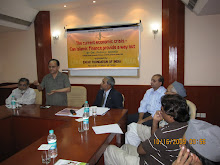(Turkey's largest circulating English daily)
Long before Barack Hussein Obama was sworn in as the 44th president of the United States of America, people in Turkey had expressed a sentiment of hope about his presidency. Reporting for The New York Observer in January 2008, Suzy Hansen quoted Omer Taspınar, director of the Turkey program at the Brookings Institution, as saying: "Turks know that Obama represents something quite different -- they've seen 'Roots.' They know the history. So an African-American with an African name and a name like Hussein -- the fact that people are willing to give him a chance, despite that he attended a madrasa, and had a Muslim father, would represent a huge change in the US, compared to the Bush-Clinton dynasties." As Turkey prepares to welcome Obama this week, what can they expect from him? And what can Obama expect in return?
A recent poll by the BBC World Service shows a majority of Turkish people believing that Obama will improve America's relations with the rest of the world. However, the number of people in Turkey who believe this (51 percent) is far below the average (68 percent) in the 17-nation BBC survey. Thus, amidst the general optimism there lies a nagging concern: Can Obama deliver on his promise?
Despite being saddled by a once-in-a generation economic crisis, the young American president has shown an uncanny ability to, in his own words, "walk and chew gum at the same time." Giving his first interview as president to the Arab TV station Al Arabiya, sending video greetings to the Islamic Republic of Iran on the Persian new year, quoting a saying (hadith) of the Prophet in one of his speeches, ordering the closing down of the abomination that is Guantanamo, retiring the use of ill-defined terms such as the "war on terror" and refraining from even rhetorically linking Islam to terrorism are all trends that evoke hope. Although these moves are mostly symbolic, they are nonetheless important, as part of leadership is setting the right tone.
How President Obama translates this emergent goodwill into tangible actions will ultimately determine his success. A recent survey by Gallup shows that nearly nine in 10 Muslims, spread across many Muslim-majority nations, support freedom of speech, defined as allowing all citizens to express their opinions freely on all major issues of the day. Overwhelming majorities support women having the same legal rights as men. Similar numbers hold beliefs that their faith ought to inform and guide them in their politics. Yet most do not want sacred religious texts to be the exclusive source of law in their societies. The most common aspiration, all across the Muslim world, is to see America help in reducing unemployment, improving economic infrastructure, respecting political rights and promoting freedom.
To get the Muslim world right, President Obama will first have to get Turkey right. During the Bush years, Turkish sentiments saw some of the most dramatic swings from overwhelmingly pro-American to stridently anti-American. Turkey sits at the nexus of several hot spots, such as Iraq, Syria and Iran. Turkey is eager to play a role in mediating an amicable solution. Turkey is not just a Muslim-majority nation; it is also a secular democracy. Turkey is also trying to grapple with its own version of separation of church (mosque) and state. The ban on students donning symbols of their faith while attending university classes strikes many in the West and across the Muslim world as excessive. But the fact that the Turkish people are continuing to debate this issue is a sign of religious, intellectual and social vitality. President Obama could use his enormous appeal across the Muslim world to prod other Muslim societies to borrow a page from Turkey and enhance their own internal dialogues about the appropriate role of religion and faith in state governance.
Back at home, a poll conducted by the non-partisan group Public Agenda shows that a clear majority of American's express support for using diplomatic and economic means to resolve conflicts, even with Iran. Most Americans want America's top foreign policy priority to be humanitarian, such as helping poor countries move out of poverty, providing more access to education and controlling the spread of deadly diseases.
All around the world there is an emerging consensus of aspiration. People are less interested in ideologies and care more about how governments can better their lives. This creates new opportunities for cooperation through sustained intellectual and diplomatic engagement. Instead of looking at Turkey as just an important geostrategic military ally, President Obama needs to prod European allies to welcome Turkey into the European Union, giving Turkey a more effective platform to act as a bridge between America, Europe and the Muslim world.
Visit msnbc.com for Breaking News, World News, and News about the Economy
Obama tells Turkey: U.S. ‘not at war with Islam’ (AP April 6, 2009)
ANKARA, Turkey - Barack Obama, making his first visit to a Muslim nation as president, declared Monday the United States "is not and will never be at war with Islam."
Urging a greater partnership with the Islamic world in an address to the Turkish parliament, Obama called the country an important U.S. ally in many areas, including the fight against terrorism. He devoted much of his speech to urging a greater bond between Americans and Muslims, portraying terrorist groups such as al Qaida as extremists who do not represent the vast majority of Muslims.
"Let me say this as clearly as I can," Obama said. "The United States is not and never will be at war with Islam. In fact, our partnership with the Muslim world is critical ... in rolling back a fringe ideology that people of all faiths reject."

















No comments:
Post a Comment